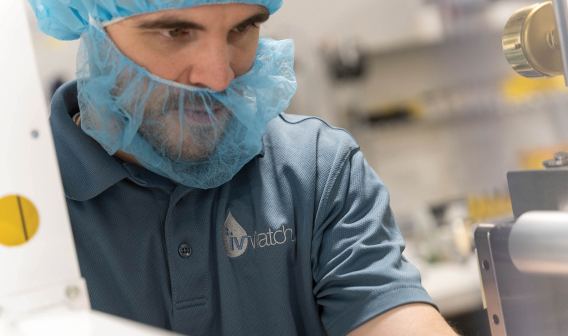It's Fast Forward for Workforce Credential Training in Virginia
Students Have Earned More Than 14,000 Industry Credentials Since 2016
Matt Poe always had an affinity for technology and cameras. Yet it wasn’t until he purchased a drone four years ago that he realized how much he enjoyed photography and videography. To hone his skills, the Abingdon resident began shooting footage of the mountainous region’s picturesque scenery.
Before he knew it, friends were asking Poe to shoot photos and videos at special events, and they were willing to pay him. That’s when Poe realized he needed a license. He found a class at Virginia Highlands Community College in Abingdon that helps students prepare for the Federal Aviation Authority’s remote pilot airman certification test.
Poe paid about $80 upfront to enroll and spent three Saturdays, or about 21 hours, in class learning about general aviation and federal regulations governing unmanned aerial systems. He sat for the license exam in October 2017 and passed. “If I hadn’t taken the class, I would never have passed,” he said.
Since gaining his certification, Poe’s hobby has grown into a small business. He uses his new credentials and skills to shoot photos and video for clients, which include commercial real estate companies. He reports that the business is growing by leaps and bounds. These skills are in high demand in Virginia as the unmanned systems industry grows.
Poe is one of the thousands of people who have earned a workforce training credential courtesy of the state’s FastForward program since it began in July 2016. The program assists Virginians with skills training to fill jobs in high-demand fields that typically require more than a high school education but less than a college degree. To date, more than 14,000 credentials have been conferred.
“The fact that 98% of the credentials are being awarded in Virginia’s top 12 occupations shows that the program is aligned in terms of what businesses are hiring for,” said Randall Stamper, assistant vice chancellor, career pathways and workforce programs, for the Virginia Community College System (VCCS).
Those occupations include the skilled trades, logistics and transportation, welding and manufacturing, healthcare, education, business, and information technology. FastForward also has added a program to train workers in the rapidly developing field of solar energy.
Funded by the General Assembly, the FastForward program offers more than 140 credentials through the state’s 23 community colleges. In fiscal year 2017, the state initially invested $4 million in the program, but it bumped that figure to $5 million because the courses were so much in demand, said Stamper. The following year, $7.5 million was utilized for the program. For the 2019-20 biennium, the state has increased funding to $19 million.
Virginia is the first state with a workforce training program that is “pay for performance,” noted Stamper.
Students are required to pay one-third of the cost of tuition for their job training upfront. The state pays the remaining two-thirds if the student passes the class and earns the industry-recognized credential. If the student doesn’t complete a class, he or she is responsible for the second third of the tuition payment, and if the student doesn’t earn the credential, the community college absorbs the final third and is not reimbursed by the state, he explained.
The average cost for a class, which typically runs from six to 12 weeks, is about $3,100 and financial aid is available for eligible students. Those interested and enrolled have the benefit of consulting a career coach at each community college on options for workforce training and the affordability of approved training programs. So far, the class completion rate remains above 90%, while the credential completion rate is 65%.
Reasons for the lower credential rate are numerous, with some businesses willing to hire someone without the credential, while other courses require hours of on-the-job employment before people are allowed to sit for an industry exam.
To date, 40% of the credentials have been earned in rural areas, which have been hard hit by the loss of such industries as textiles and coal. The average student age is 36 years old and most have dependents.
According to VCCS data, students who successfully complete a credential report increased pay, employer-sponsored health care, paid vacation time, and better work schedules.
“It serves a dual purpose,” said Jenny Carter, director of workforce partnerships and projects for VCCS. “It helps a person improve their life situation, and it helps an employer fulfill their needs to be viable and competitive. It’s a win-win.”
Ken Garrison, executive director of the Heavy Construction Contractors Association in Manassas, said the program has been helpful in training a new pipeline of heavy equipment operators. His 170-member association worked with Lord Fairfax Community College in the Northern Shenandoah Valley to develop a program in December 2017 that trains students through the use of simulators. While infrastructure projects are booming in Northern Virginia, the industry’s workforce is aging, said Garrison, and it needs younger workers to replace ones who will be retiring. So far, 45 students have completed the training.
“Association members have a huge appetite for hiring the graduates,” said Garrison. “This is not just a job, it’s a career. You can start out making $36,000 a year and get up to the $56,000 range very quickly.” Plus, there are opportunities to move into management as jobs become open for foremen and site superintendents.
“Our industry has been thrilled at both the quality of what the community colleges are putting out and the drive of the workforce side of the system to put this in place. They see the need, they see the opportunity, and they are working directly with the industry to make this happen.”
Looking to the future, FastForward credentials will continue to be delivered through noncredit training. The next step in the program’s growth is to align these credentials, comprehensively, toward credit-based outcomes as students return to college.




